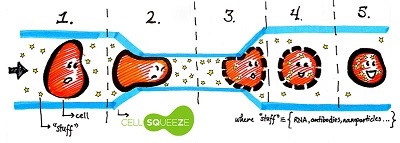 |
| An illustration depicting the CellSqueeze technology for human-derived cells--Courtesy of SQZ Biotech |
Researchers at MIT, including drug delivery leader Robert Langer, unveiled early in 2013 a new technology to make getting drugs into cells easier to do. By gently "squeezing" a cell in a narrowing glass tube, the scientists were able to burst the cell membrane so that drugs could enter through tiny holes that form in the process.
And now, with small but prestigious contributions from the scientific community, SQZ Biotech is looking to launch the platform to be used in commercial applications. The company was founded by Langer and MIT colleagues Klavs Jensen, Armon Sharei and Agustin Lopez Marquez with the CellSqueeze platform at the center of its vision.
SQZ collected the $100,000 grand prize from the startup accelerator MassChallenge's 2014 competition. The nonprofit MassChallenge is the largest accelerator in the world, and SQZ was among 1,650 original applicants globally. And then Boeing and the Center for the Advancement of Science in Space stepped in with the $200,000 CASIS-Boeing Prize for Technology in Space, which looks to make use of the CellSqueeze platform on the International Space Station.
The CellSqueeze system is a chip with cell-sized channels from one end to the other. Each channel has a narrow point that is even smaller than the cell, though, and it is at this point that temporary holes are made in the cell membrane, allowing the cell to take up molecules that are also in the chip's channels. Shortly thereafter, the cell repairs itself, according to a release from SQZ.
 |
| Armon Sharei |
Sharei was the lead researcher in 2013 when the MIT team published a study in the Proceedings of the National Academy of Science. At the time, he explained to FierceDrugDelivery: "We were working on a system where you basically shoot material into a cell, and we found that the deformed cells were an important part of that. We're very excited about the clinical application, from stem cells to cancer therapies and other areas such as imaging."
SQZ formed in 2013 exclusively to commercialize the CellSqueeze platform and has brought in more than $1 million in seed funding, as well as further academic grants. MIT Angels, Walnut Angels and Maine Angels have all invested in the company.
"Our deceptively simple new way to control cell behavior offers exciting promise for studies of basic cell biology as enabling cell-based therapies previously only envisioned," SQZ CEO Marquez said in a statement. "Our strategy is to work with strategic partners to expand high-impact applications of CellSqueeze. A few examples include regenerating damaged tissue, training the immune system to fight cancer, creating induced pluripotent stem cells as disease models, understanding disease mechanisms and validating drug candidates for clinical trials, all of which are areas of medical need and high scientific relevance."
- here's the release